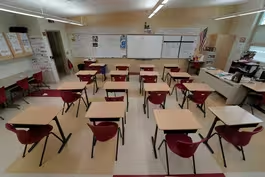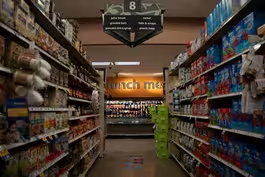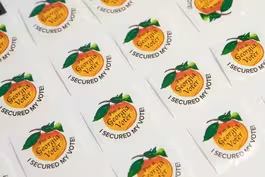
Teen forced to collect her own evidence in sexual abuse case
Clip: 10/29/2024 | 10m 56sVideo has Closed Captions
Florida teen forced to collect her own evidence to prove she was sexually abused
We’re told if you’re a victim of a crime, to go to the police and report it. But what happens when they don’t believe you? From the Center of Investigative Reporting, Rachel de Leon tells how far one child had to go to prove her innocence. A word of caution, this story involves details of child sexual abuse.
Problems playing video? | Closed Captioning Feedback
Problems playing video? | Closed Captioning Feedback
Major corporate funding for the PBS News Hour is provided by BDO, BNSF, Consumer Cellular, American Cruise Lines, and Raymond James. Funding for the PBS NewsHour Weekend is provided by...

Teen forced to collect her own evidence in sexual abuse case
Clip: 10/29/2024 | 10m 56sVideo has Closed Captions
We’re told if you’re a victim of a crime, to go to the police and report it. But what happens when they don’t believe you? From the Center of Investigative Reporting, Rachel de Leon tells how far one child had to go to prove her innocence. A word of caution, this story involves details of child sexual abuse.
Problems playing video? | Closed Captioning Feedback
How to Watch PBS News Hour
PBS News Hour is available to stream on pbs.org and the free PBS App, available on iPhone, Apple TV, Android TV, Android smartphones, Amazon Fire TV, Amazon Fire Tablet, Roku, Samsung Smart TV, and Vizio.
Providing Support for PBS.org
Learn Moreabout PBS online sponsorshipAMNA NAWAZ: We're told, if you're a victim of a crime, to go to the police and report it.
But what happens when they don't believe you?
From the Center for Investigative Reporting, Rachel de Leon has the story of how far one child had to go to prove her innocence.
And a word of caution: This story involves details of child sexual abuse.
RACHEL DE LEON: In the fastest growing county in America, Polk County, Florida, it's longest-serving sheriff Grady Judd has a large media presence and delivers unapologetic tough-on-crime messages, like this one about an armed man involved in a car chase.
GRADY JUDD, Polk County, Florida, Sheriff: And he chose to die in a gunfight.
We accommodated him.
He said he wanted to go to heaven.We made the arrangements for him.
RACHEL DE LEON: Running this fall for his sixth term in office, he is a popular sheriff, once invited to the White House by then-President Donald Trump to discuss issues facing sheriffs and later asked to join a federal council overseeing all programs related to missing and exploited children.
He has made it his department's priority to go after child predators.
GRADY JUDD: We will go to the ends of the earth to arrest you if you victimize children.
TAYLOR CADLE, Victim: Why punish me?
What did I do for you to punish me?
RACHEL DE LEON: But Taylor Cadle's extraordinary case raises questions about how, despite Sheriff Judd's tough-on-crime rhetoric, his department treated a child victim as a criminal.
TAYLOR CADLE: Nothing that I did was I in the wrong at all.
RACHEL DE LEON: Taylor had a traumatic childhood.
The state took her away from her birth mother when she was 7 due to violence and neglect at home.
After a year-and-a-half in foster care, she was adopted by her great uncle Henry Cadle and his wife.
But, within months, she says he began sexually abusing her.
TAYLOR CADLE: I kept it secret because, going through foster care, it was already so much of a traumatic experience that I was scared to go back.
RACHEL DE LEON: Over the next three years, she says Henry Cadle used long car rides to abuse her off this road.
One day, in 2016, Taylor disclosed the abuse to an adult member of her church, which launched an investigation by multiple agencies.
WOMAN: OK. Well, how old are you?
TAYLOR CADLE: Almost 13.
I'll be 13 in October.
RACHEL DE LEON: That week, Taylor was asked to recount what happened to her several times.
In a recorded interview with a child welfare worker, she went into detail, hoping she would be believed.
TAYLOR CADLE: And he pulled over on the side of the road.
And told me to get in the front seat.
RACHEL DE LEON: But in a separate interview recorded by Sheriff's Detective Melissa Turnage, the tone turned confrontational.
DETECTIVE MELISSA TURNAGE, Polk County, Florida, Sheriff's Office: If you're mad because you got your phone taken away, let's say that now and be done with it.
TAYLOR CADLE: From the get-go, she was rude, simple terms, rude.
When she continuously asked me the same question over and over, I almost told her she should probably write down what I'm saying,because I didn't feel like she was listening.
RACHEL DE LEON: Turnage treated Taylor less like a victim and more like a suspect.
DETECTIVE MELISSA TURNAGE: Do you want to go live back in foster care?
Because more than likely, if he's arrested, they're not going to let you stay there.
If it's not the truth, you're fixing to hurt a lot of people.
TAYLOR CADLE: Everything I told you earlier is not a lie.
RACHEL DE LEON: Still, Turnage concluded that tailor-made it up.
The detective wrote that she couldn't find Henry Cadle on gas station security footage buying condoms, like Taylor said he had, and she couldn't pinpoint the location of the assault on that long stretch of road.
TAYLOR CADLE: Every interview that we talked, she made me out to be a liar.
And I told her time and time and time and time again that I am not the liar here.
JERRI SITES, Child Protection Concepts: There is no excuse for the manner in which this case was handled.
RACHEL RACHEL DE LEON: Jerri Sites, a forensic expert who has worked with thousands of child abuse cases, listened to the interviews between Turnage and Taylor.
She says Turnage's techniques were inappropriate, especially because very few children, less then 4 percent, fabricate stories of sexual abuse.
But kids with traumatic histories are less likely to be believed.
JERRI SITES: Kids who have that history of adversity are the perfect victim because their offender knows they're not going to be as credible because they have had this difficult life.
TAYLOR CADLE: There's no way, with the details that I gave or the things that I said or certain locations, that I could have fabricated that big of a story.
There was no way.
RACHEL DE LEON: Instead of Henry Cadle going to court, 13-year-old Taylor faced a judge for a charge of lying to police.
She had no lawyer, only her adoptive mother, Henry Cadle's wife.
TAYLOR CADLE: I walked into that courtroom scared out of my mind.
And my mom told me in the car to just plead guilty and get it over with.
RACHEL DE LEON: She was sentenced to one year of probation with community service.
She also had to write two apology letters, one to her abuser and the other to a sheriff's officer.
Taylor's experience is like hundreds of sexual assault cases I found nationwide as part of a yearslong investigation into police charging alleged victims with lying.
Due to privacy laws, I could find only a handful involving children, one as young as 11.
Throughout, there was a pattern of police missing crucial steps in investigations.
But Taylor's case is unique because she vindicated herself.
JOEL DEMPSEY, Retired Detective, Polk County, Florida, Sheriff's Office: My on-call phone rang, and it was my on-call supervisor for my unit.
RACHEL DE LEON: Joel Dempsey was the detective assigned to the case when Taylor called the police to report she was sexually assaulted again.
JOEL DEMPSEY: There was a previous investigation that the victim was on probation for.
And then I also learned that new evidence would prove that some of the victim's statements were true.
RACHEL DE LEON: Using her cell phone, 13-year-old Taylor sure she got bulletproof evidence this time.
JOEL DEMPSEY: She had taken some photographs with her phone.
She also took pictures of an empty condom box, as well as the clock on the vehicle, and then a short video of what appears to be the suspect walking around the truck.
TAYLOR CADLE: This is the exact phone that I used in the 2017 case.
I pulled up the camera, and on this specific phone, if you just tap the screen anywhere, it just takes a picture.
So, in my head, I was, like basically kind of like swiping, but I was, in reality, I was taking pictures of everything that was happening.
RACHEL DE LEON: Just like last time, she detailed the abuse to a child welfare worker, but with one big difference.
TAYLOR CADLE: Everything that they didn't find evidence for last time, I kind of tried to make sure that it was there this time, just so that way my story would get believed.
RACHEL DE LEON: The photos she took with her phone were graphic.
JOEL DEMPSEY: It was very shocking to see that, very sad, but a fantastic thing that she was able to collect it.
RACHEL DE LEON: In Henry Cadle's recorded statement to Dempsey, he was adamant he was innocent.
JOEL DEMPSEY: I got the impression that, because of the previous investigation and the result of it, that he felt somewhat secure.
But I want to ask you plainly, did you touch her?
HENRY CADLE, Convicted Felon: No.
Hell no.
JOEL DEMPSEY: Now's the time to tell me so I can get out in front of it.
HENRY CADLE: No.
No.
No.
JOEL DEMPSEY: ... try to handle - - figure out what's going on.
HENRY CADLE: No.
No, nothing happened.
RACHEL DE LEON: At 4:30 a.m., the detective confronted Henry Cadle with the evidence.
JOEL DEMPSEY: Hey, Henry.
HENRY CADLE: Hey.
JOEL DEMPSEY: You wanted to see what I got here?
The pictures?
HENRY CADLE: Sure.
JOEL DEMPSEY: See this?
HENRY CADLE: OK. OK. JOEL DEMPSEY: You know who that is?
HENRY CADLE: Yes.
JOEL DEMPSEY: Who?
HENRY CADLE: It's me.
RACHEL DE LEON: Henry Cadle was sentenced to 17 years in prison for sexual battery of a minor.
Taylor's criminal charges overturned.
JOEL DEMPSEY: I don't remember any other case where the victim had the forethought or the intelligence to collect their own evidence and to be so thorough, just unbelievable amount of presence of mind that she showed.
RACHEL DE LEON: I reached out to Detective Melissa Turnage and her boss, Grady Judd, multiple times to ask for an interview.
Turnage never responded, and Judd's office declined an interview and didn't answer repeated requests for comment.
STATE SEN. LAUREN BOOK (D-FL): Where was a person for Taylor?
Where was a person to stand up to say, stop, and stop it now?
RACHEL DE LEON: Since 2002, Florida State Senator Lauren Book has been working on state bills aimed at protecting victims of child abuse.
She sent a letter to the sheriffs office requesting they look into how the system failed Taylor the first time around.
STATE SEN. LAUREN BOOK: It happened to Taylor, and Taylor is enough to fix the system.
RACHEL DE LEON: Senator Book says charging Taylor and letting her be assaulted again was entirely preventable and properly trained professionals should have intervened at multiple levels.
STATE SEN. LAUREN BOOK: You need to have people who are properly trained and who are in it to do the right thing and really walk a survivor through this process.
JERRI SITES: So let's talk about being trauma-informed and what that approach means.
RACHEL DE LEON: Jerri Sites trains investigators and law enforcement officers on how to help children who come forward with allegations of sexual abuse.
She believes this is what could prevent a detective from doing this to another child like Taylor.
JERRI SITES: Certainly, forensic interviewing has just really made a huge difference in child abuse cases, having people who are highly trained and understand linguistics and child development and how to approach kids so that they can gather accurate information in a neutral, supportive way.
RACHEL DE LEON: Now a mom of two, Taylor is healing by giving her children the kind of safety she never had.
She says she's never received an apology from authorities, but hopes they use the lessons from her case going forward.
TAYLOR CADLE: I want for them to understand what they did and to clearly see where they messed up, to truly see what happened and fix it, because no child should ever have to go through anything that I went through.
RACHEL DE LEON: For the "PBS News Hour" and the Center for Investigative Reporting, I am Rachel de Leon in Polk County, Florida.
Candidates race to get final messaging to voters
Video has Closed Captions
Clip: 10/29/2024 | 4m | Candidates race to get final messaging to voters with one week until Election Day (4m)
Comparing Harris and Trump education policy proposals
Video has Closed Captions
Clip: 10/29/2024 | 6m 32s | Comparing the education policy proposals from Harris and Trump (6m 32s)
Examining how Trump, Harris plans could affect inflation
Video has Closed Captions
Clip: 10/29/2024 | 5m 58s | Examining how economic plans from Trump and Harris could affect inflation (5m 58s)
Israel bans UNRWA as northern Gaza health system collapses
Video has Closed Captions
Clip: 10/29/2024 | 5m 35s | Israel bans U.N. agency helping Palestinians as northern Gaza healthcare system collapses (5m 35s)
Southeastern Georgia a focal point for both campaigns
Video has Closed Captions
Clip: 10/29/2024 | 7m 22s | How southeastern Georgia became a political hotspot in the presidential campaign (7m 22s)
What to expect from Kamala Harris' closing argument
Video has Closed Captions
Clip: 10/29/2024 | 3m 43s | What to expect from Kamala Harris' closing argument to voters (3m 43s)
Providing Support for PBS.org
Learn Moreabout PBS online sponsorship
- News and Public Affairs

FRONTLINE is investigative journalism that questions, explains and changes our world.

- News and Public Affairs

Amanpour and Company features conversations with leaders and decision makers.












Support for PBS provided by:
Major corporate funding for the PBS News Hour is provided by BDO, BNSF, Consumer Cellular, American Cruise Lines, and Raymond James. Funding for the PBS NewsHour Weekend is provided by...






